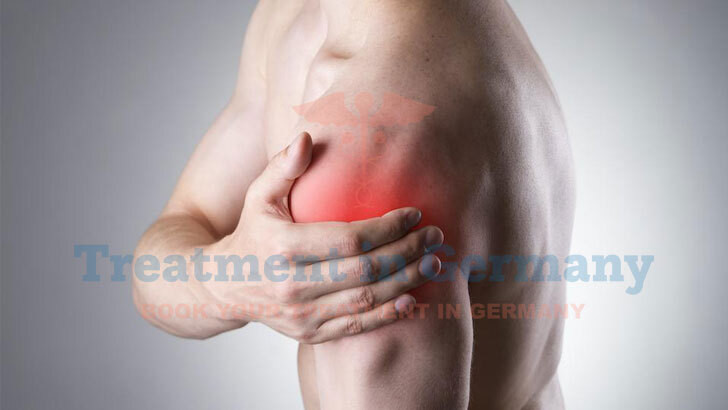
Admin
12-16-2024
Arthroscopy and Sports Medicine Treatment in Germany
Shoulder impingement happens when the top outer edge of your shoulder blade pinches your rotator cuff beneath it.
Shoulder Impingement Syndrome Treatment in Germany
Impingement syndrome of the shoulders or sub acromial impingement syndrome, is a prevalent disorder that produces pain and restricted movement across the shoulder joint. This condition occurs when the rotator tendons get squeezed or inflamed as they pass via the sub acromial space between the acromion a bony spur over the top of the scapula and the head of the hummers.
For this disease, doctors in Germany have improved diagnostic and treatment methods, thus giving patients from all over the world the highest quality of treatment and new ways to deal with this problem.
Causes and Risk Factors
Shoulder impingement syndrome can develop as a result of several factors:
- Overhead arm motions that are repeated
- Poor posture
- Abnormality in the rotator cuff muscles
- Differences in the joint structure of shoulders
- Tendon and tissue abnormalities that occur with age
This condition is more likely to occur in athletes who perform repeated actions, such as baseball, tennis, and swimming.
Diagnosis Methods in German Hospitals
Germany’s medical institutions use advanced tools for diagnosing and evaluating shoulder impingement syndrome. These methods include:
- Physical Examination: In most cases, talented orthopedic doctors are involved in doing precise physical examinations that include a range of motion, strength, and areas of pain. Imaging Studies:
- Radiography is used to see skeletal structure and check for anomalies.
- CT scans for bone and calcification detection.
- Real-time tracking of tendon movement through the use of ultrasounds.
- Diagnostic Injections: Other invasive methods include local anesthetic blocks used in both diagnosis as well as offering short duration of pain relief.
This is because early diagnosis and timely treatment enable a professional trainer to come up with the correct management plan to avoid more damage to the shoulder.
Conservative Treatment Options
Most of the time, shoulder impingement syndrome is treatable without the need for surgery. Germany’s medical professionals often begin with conservative treatments, including:
- Rest and Activity Modification: Patients who experience significant symptoms should avoid activities that cause them to worsen and should rest their shoulders.
- Physical Therapy: Exercise regimes tailor-made for the rotator cuff muscles in an effort to enhance the mechanics of the shoulder joint.
- NSAIDs: Painkillers and anti-inflammatory medications that are not corticosteroids.
- Corticosteroid Injections: Selective deposition to offer more protracted analgesia as well as minimize inflammation within the bone site.
- Manual Therapy: Apart from the use of hands when applying pressure on muscles, the skilled therapists manipulate the joints to increase their range and decrease the tightness of the affected muscles.
- Posture Correction: Includes education and training focusing on improving the general physical attitude in order to diminish pain trauma at the shoulder joint.
Such conservative treatments are usually effective in alleviating symptoms, and the patient might not require surgery.
Advanced Surgical Interventions
In cases where conservative methods of treating SIS are not effective, Germany’s orthopedic surgeons perform modern surgical procedures in treating SIS. These procedures include:
- Arthroscopic Sub acromial Decompression: An arthroscopic procedure in which the surgeon trims inflamed tissue and bone spurs to make more space around the rotator cuff tendons.
- Rotator Cuff Repair: The impingement has resulted in a rotator cuff tear; the affected tendon can be repaired through arthroscopic surgery.
- Biceps Tenodesis: Through the involvement of the long head of the biceps tendon, where problems are interlinked with impingement complaints.
- Shoulder Replacement: In some instances, especially where arthritis can be severe, the doctor will suggest a total or partial shoulder replacement.
German surgeons are recognized for their skills in the conduct of these operations with low incidence of failure and post-surgical complications.
Rehabilitation and Recovery
Rehabilitation is very important especially once the patient has been treated for shoulder impingement syndrome, to reduce the chances of a relapse. German rehabilitation centers offer comprehensive programs that include:
- Specific treatment plans concerning physical therapy
- Protocols for returning workers to perform gradual shifts of activity
- Practice for occupational therapy for the performance of work tasks
- Pain management techniques
- Information on good posture and body alignment
All of these programs are individual and feature optimal results with regard to the patient’s needs and desired outcomes.
Why Choose Germany for Treatment?
Germany is renowned for taking care of orthopedic cases, especially the impingement syndrome of the shoulder. Here's why many international patients opt for treatment in Germany:
- Cutting-edge Technology: Today’s hospitals in Germany are fully supplied with all the necessary diagnostic and treatment tools.
- Renowned Expertise: The orthopedic surgeons working in Germany are also skilled and experienced and they are even sought after by countries all over the world.
- Comprehensive Care: Services are provided holistically, from the time of diagnosis and or referral, during treatment and follow-up.
- Research and Innovation: The orthopedic treatments in Germany boast top-notch and modern facilities in Germany’s medical institutions.
- Multilingual Staff: Most of Germany’s healthcare facilities are bilingual, thereby providing an easy way to communicate with their clients.
